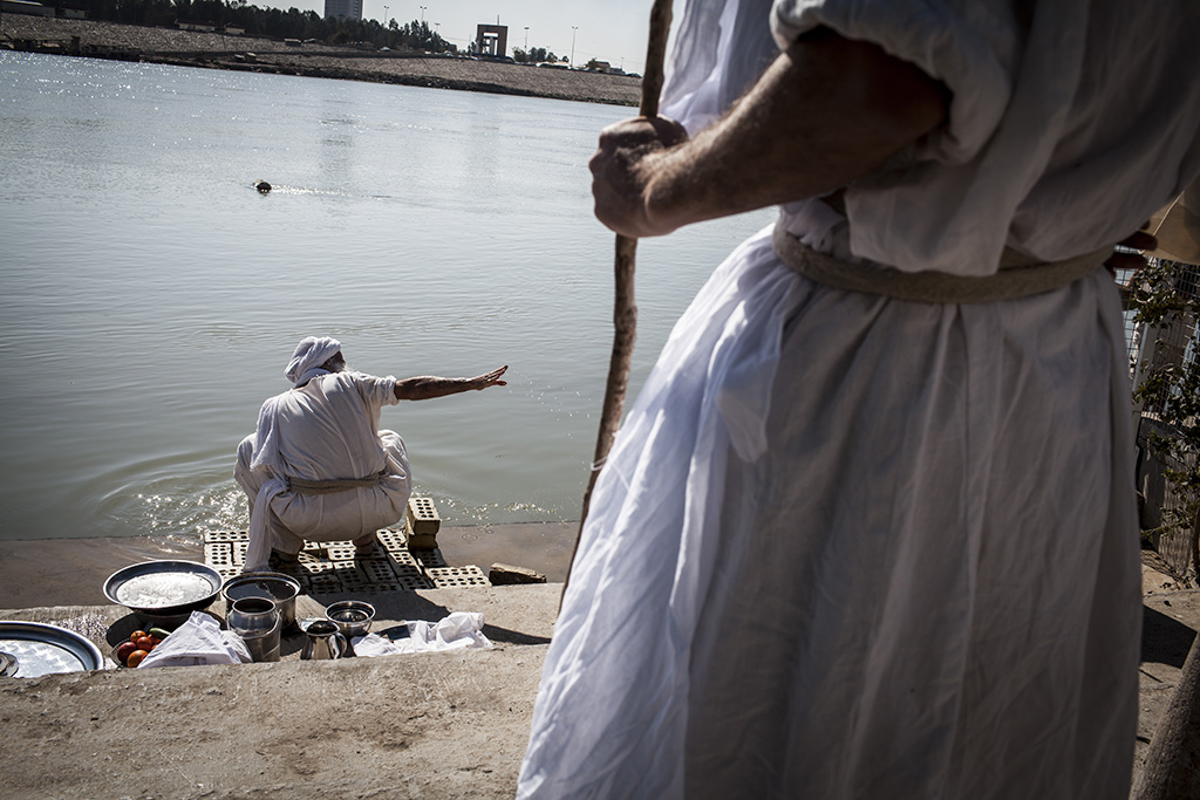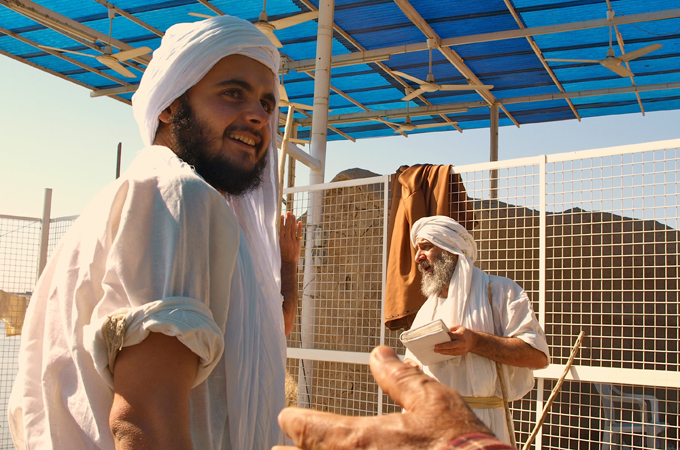Disciples of St John the Baptist under attack
One of the Middle East’s oldest religious communities is on the verge of disappearing amid Iraq violence.

Baghdad, Iraq – As on every Sunday, Mandaeans gather by the west bank of the Tigris River, dressed in plain white clothes. All of them wear wooden clogs and some boast long, white beards. Were it not for the barbed wire around them and the fumes from Baghdad’s Dora refinery on the opposite bank of the river, it could be a scene from 2,000 years ago. In fact, many say it is a miracle that the Mandaean community is still alive in Baghdad in 2013.
The Portuguese who arrived in southern Iraq in the 17th century dubbed them “the Christians of St John”. Mandaeans follow the teachings of John the Baptist and claim to be independent of Judaism, Christianity and Islam. The religion does not allow conversions into the faith.
 |
| Fewer than 10,000 Mandaeans remain in Iraq, says Sattar Hillo [Andoni Lubaki/Al Jazeera] |
“Christians turned baptism into a sacrament, but we use it for every celebration, from weddings to funerals,” Sattar Hillo, head of the Mandaean community, told Al Jazeera before ablution. “River water is our tool to purify both our body and our soul.”
Before starting with the ritual in the Tigris, Hillo closes his eyes to recite a passage of the Ginza, the Mandaeans’ sacred book. He says their distinctive Aramaic language is still spoken in Iran – but that in Iraq it survives only in liturgy.
The scene may look idyllic, but Hillo describes the current situation as being the “most critical moment in Mandaeans’ history”.
He might be right. According to a report by Human Rights Watch released in February 2011, 90 percent of Mandaeans have either left or been killed since the invasion of Iraq by US-led forces in 2003. Hillo claimed there were less than 10,000 left in the country.
“It is not just about religious persecution,” Khais Abuleif, a fellow attendant at the river ceremony, told Al Jazeera. “Traditionally, we have been goldsmiths and silversmiths, but the last few years have become a nightmare for us due to the growing levels of criminality,” he said, denouncing what he called a “hellish chain of threats, assaults, rapes and forced conversions” inflicted upon them.
The political crisis in Iraq and the war in neighbouring Syria have inflamed violence in the country to levels unseen since 2008. According to the Iraq Body Count database, more than 8,000 people have been killed just this year.
Mandaeans abroad
From the banks of the Karoun River in southwestern Iran, Mandaean activists like Siavas Khafafizade claim that the number of his co-religionists in Iran has declined from 12,000 in 1977 to fewer than 3,000 in 2013.
We have no worshipping places and a lot of our documents and relics where destroyed during the Iraq-Iran war (1980-88).
“We have no worshipping places, and a lot of our documents and relics were destroyed during the Iraq-Iran war [1980-88],” Khafafizade told Al Jazeera in a telephone interview.
Mandaeans do not seek new converts, and Shia clerics do not see them as a threat. However, Khafafizade complains about the lack of constitutional recognition of their faith in Iran.
Their numbers are doubtlessly decreasing in Iran – but there are large Mandaean communities in Australia, Sweden and the US. The diaspora is highly active through organisations like the Mandaean Associations Union, a US-based NGO set up to protect Mandaean communities worldwide. The union’s chair, Suhaib Nashi, told Al Jazeera that more than 85 percent of the whole Mandaean community – about 60,000 people – live abroad, and so do the vast majority of their priests.
“There’s very little knowledge about the drama Mandaeans are going through. We could be wiped out in a generation or two without the world even knowing we ever existed,” said Nashi, a medical doctor who is based in the US.
The London-based Mandaean Human Rights Group represents the fewer than 1,000 Mandaeans in the UK. Their spokesperson, Layla al-Roomi, echoed Nashi’s words: “We feel our community, our religion and our culture are slipping away from our hands.”
Roomi told Al Jazeera that the United Nations High Commissioner for Refugees (UNHCR) should urgently arrange for the resettlement of all Mandaean refugees currently in Syria. Among the million Iraqis who fled to neighbouring Syria – which before the uprising was one of the last secular havens for religious minorities in the Middle East – thousands were Mandaeans. They are now finding out that they left one dangerous country for another.
“We are very concerned about the fate of the around 1,000 Mandaeans in Syria, as these people have already exhausted their resources to flee persecution and violence in Iraq,” added Roomi.
The last sheikh?
Back on the shores of the Tigris, Anmar – a young sheikh – struggles to chase away a wasp with a piece of cloth from Hillo’s arm. He tries not to harm the insect, but the spiritual leader was stung anyways.
 |
| Anmar is a young Mandaean sheikh [Karlos Zurutuza/Al Jazeera] |
“It’s a sin for us to inflict pain to any living being,” Anmar told Al Jazeera. Carrying weapons or shedding blood is against the Mandaeans’ doctrine, he added, “even in self-defence”.
Today a university student, Anmar was only ten years old when Iraq’s former leader was toppled in 2003. The situation was not much better during Saddam’s times, when Mandaeans were forced to violate some tenets of their faith. Sons of priests were often forced to cut their hair and beards – which barred them from becoming priests themselves, and which led to the decimation of the spiritual leaders.
Anmar – whose hair and beard are still unshorn – says he is ready to face the challenges ahead. “I understand those who left the country, but I decided to stay. I owe it to God, to John the Baptist and to all those who came before me,” said the young man – who may end up becoming one of Iraq’s last remaining Mandaean priests.